
by Steve | Jul 10, 2017 | July-August 2017, Magazine, Magazine Articles
 By Steve Beard-
By Steve Beard-
Dr. Tom Caneta has spent the last nine years sequestered in the Nuba Mountains of the African nation of Sudan. Around the clock, he heals the sick, bandages the broken, and takes cover from bombs dropping overhead. Caneta is the last doctor left in this civil war-torn region marked by starvation, disease, and death. He treats up to 500 patients per day.
In June, Caneta was named winner of the Aurora humanitarian prize – $100,000 to Caneta and $1 million split between three charities of his choosing. Accepting the award, Catena said: “When the bombs are raining down, I think that any job must be better than this – even being an accountant. But when one little kid unexpectedly pulls through – it’s all worth it.”
The war-zone Mother of Mercy hospital is a long way from his previous life. Originally from Amsterdam, New York, Catena played football at Brown University and earned his medical degree from Duke University through a Navy scholarship. Catena visited Kenya while in medical school and returned as a medical missionary following his residency in Indiana.
“My decision to stay here was a simple one,” Catena told Catholic News Service (CNS). “As the only doctor at the only major hospital in the Nuba Mountains, I could not leave in good conscience. Also, as a lay missionary, I felt it was important to show the presence of the church in this time of need – to show that the church does not abandon her people when a crisis arises.”
In 2015, Catena was featured in Nickolas Kristoff’s New York Times column profiling his heroism and reporting that the doctor missed pretzels and ice cream, but mostly his family. The Kristoff column also noted that Catena wears a bracelet that says “John 3:30.” It is his focus each day: “He must become greater; I must become less.”
“I’ve been given benefits from the day I was born,” Catena told Kristoff. “A loving family. A great education. So I see it as an obligation, as a Christian and as a human being, to help.”
In response, Dr. Tom works daily to “pry out shrapnel from women’s flesh and amputate limbs of children, even as he also delivers babies and removes appendixes,” reported Kristoff. “He does all this off the electrical grid, without running water, a telephone or so much as an X-ray machine — while under constant threat of bombing.”
There is a local intensity of the love for Dr. Tom. “People in the Nuba Mountains will never forget his name,” said Lt. Col. Aburass Albino Kuku of the rebel military force. “People are praying that he never dies.”
A Muslim chief named Hussein Nalukuri Cuppi offered highest praise: “He’s Jesus Christ.” Kristoff wrote, “The chief explained that Jesus healed the sick, made the blind see and helped the lame walk — and that is what Dr. Tom does every day.”
“There also are many, many secular aid workers doing heroic work,” Kristoff continues. “But the people I’ve encountered over the years in the most impossible places — like Nuba, where anyone reasonable has fled — are disproportionately unreasonable because of their faith.”
Catena summarized his life’s challenge in a speech addressing the 2015 graduating class at Brown University: “Everyone is in search of happiness. Everybody is in search of fulfillment. I think if you really want fulfillment in this life, what I would suggest to you is go and get rid of everything you have. Sell everything you have. Get rid of all of your baggage and go live a life of full and total service to other people. I think if you do that, you will find that the rewards are incredible. You will find that you have fulfillment more than you could ever have imagined. So I throw that challenge out to you.”
Steve Beard is the editor of Good News. To help Dr. Tom Catena, go to www.amhf.us. Photo: www.cmmb.org.

by Steve | Jul 10, 2017 | July-August 2017, Magazine, Magazine Articles
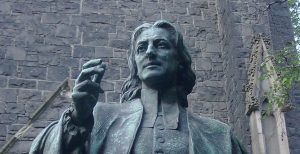
Statue of John Wesley outside Wesley Church in Melbourne, Australia. Photo by Adam Carr, Wikimedia Commons.
By Luther Oconer-
On May 24, Methodists all over the globe commemorated the 279th anniversary of John Wesley’s “heart strangely warmed” experience at Aldersgate Street in London. While we generally mark the event as Wesley’s evangelical conversion, his own account will reveal that it is not merely about conversion but about his theology of salvation. Two key theological themes emerge in his narrative, namely: 1) how one is saved, and 2) how one knows that he or she is saved. Let us begin by examining his journal:
“In the evening I went very unwillingly to a society in Aldersgate Street, where one was reading Luther’s Preface to the Epistle to the Romans. About a quarter before nine, while he was describing the change which God works in the heart through faith in Christ, I felt my heart strangely warmed. I felt I did trust in Christ, Christ alone for salvation, and an assurance was given me that he had taken away my sins, even mine, and saved me from the law of sin and death” (Journal, May 24, 1738, Works, 18:249–50).
As he was listening to the reading, Wesley described: “I felt my heart strangely warmed. I felt I did trust in Christ, Christ alone for salvation….” What did he mean by this? Wesley was clearly referring to his experience of what he would call “Justifying Faith” in keeping with the Apostle Paul’s teaching, for example, in Romans 5:1: “Therefore, since we are justified by faith, we have peace with God through our Lord Jesus Christ…” (NRSV). In other words, in order for one to be saved, one needs to have that kind of faith. Wesley began to recognize his need for it two years earlier when he first encountered the Moravians on his voyage to Georgia and as he fellowshipped with them in Savannah. Augustus Spangenberg, one of the leaders of the Moravian mission in Georgia, led Wesley to realize his need for Justifying Faith when he asked him, “but do you know He [Jesus] has saved you?” (Journal, February 7, 1738, Works, 18:145).
What is worth noting here is that none of Wesley’s Moravian guides told him to simply recite the “sinner’s prayer” or “accept Jesus Christ as Lord and Savior” as we would typically encourage seekers today. They did not prescribe shortcuts or formulas for attaining this faith. For them, as well as Wesley, faith was a gift from God. Wesley even called it a supernatural sense that God infuses to us so that we can declare with great certainty “a sure trust and confidence that Christ died for my sins, that he loved me and gave himself for me” (Sermon 5, “Justification by Faith,” IV.2, Works, 1:194). Such understanding is very much consistent with Paul’s reminder in Ephesians 2:8 that it is “by grace” that we “have been saved through faith” (NRSV).
Wesley wrestled to gain this kind of faith for months leading up to Aldersgate. The urgency for this experience reached its peak as the evangelical revival began to take hold of his Holy Club friends in London in the beginning months of 1738. At one point, Wesley even felt that he should stop preaching until he had received the gift of Justifying Faith, but the Moravian Peter Böhler encouraged him to “Preach faith till you have it, and then, because you have it, you will preach faith” (Journal, March 4, 1738, Works, 18:228). It also did not help that even his brother Charles experienced it three days earlier on Pentecost Sunday as he felt a “strange palpitation of heart.”
Prior to Aldersgate, we find in Wesley a broken man. It was most likely out of frustration that he “went unwillingly” to the meeting at Aldersgate Street. But just as he had seemingly given up hope in gaining this faith, it was also at that very moment that God took hold of his heart and he felt it “strangely warmed.”
Wesley then testified that “an assurance was given me that He had taken away my sins, even mine, and saved me from the law of sin and death.” What did he mean by this? He is essentially indicating that his God-given Justifying Faith led to his Justification — that God pardoned him (“taken away my sins”) and saved him (“saved me from the law of sin and death”). But to be justified was not merely head knowledge for Wesley. Notice that he used the word “felt” twice and added, “an assurance was given” to him. Wesley was essentially referring to the experience described by Paul in Romans 8:16: “The Spirit itself beareth witness with our spirit, that we are the children of God” (KJV). This is what Wesley and later Methodists called the “witness of the Spirit,” a phrase commonly associated with the doctrine of Assurance.
For Wesley, the witness of the Spirit is the Holy Spirit’s work to assure us that we are God’s children. It is a Spirit (upper case “S”) to spirit (small case “s”) communication. When this happens, you just know it! It is something that cannot be simply explained through words. You will not know through human language, but through the language of the Holy Spirit that is impressed in your spirit. This witness is a supernatural act of God that assures the believer that his or her relationship with God is secured.
What can we draw from Wesley’s experience? If faith is God’s gift, we should not force-feed it on people or mislead them into thinking that by simply reciting the sinner’s prayer they have somehow attained it. For Wesley, Justifying Faith is not merely intellectual “assent.” Even the devil is capable of acknowledging that Jesus is God, he argued (Sermon 1, “Salvation by Faith,” I.1–5, Works, 1:119–121). Unfortunately today, we have short-circuited our way to Justifying Faith and we wonder why we end up with many “almost Christians” — those who look and talk like Christians but are not deeply rooted in Christ (See Sermon 2, “The Almost Christian,” Works, 1:131–141). It is time to let Wesley’s Aldersgate experience inspire us to recover the understanding that faith must be cultivated through discipleship.
If faith is a gift from God, we need to know that God will never leave us clueless as to whether we have indeed received it. We cannot just “claim it” and hope something happened. With the Holy Spirit as our witness, we will know and feel it. The Holy Spirit will testify this assurance to our hearts! But consequent to this sense of faith, we also need to take into account the importance of the role of supernatural encounters in Christian experience.
God touched Wesley at Aldersgate and that is why Wesley “felt” his “heart strangely warmed.” I suspect Wesley was not speaking in metaphorical terms here. He literally felt heat in his chest! He had a supernatural encounter with God. This strange warmth led him to know for sure, at that very moment, that God had surely justified him. It is my prayer that Aldersgate will inspire us to open ourselves up to the possibility of encountering the Holy Spirit in a supernatural way. This is probably what is missing today for most people who call themselves Methodists. While we celebrate Wesley’s Aldersgate experience for its significance to Christian history, may we, just like Wesley and many of the saints who came before and after him, also seek to have our own Aldersgate experience.
Luther Oconer is assistant professor of United Methodist Studies and director of the Center for Evangelical United Brethren Heritage at United Theological Seminary in Dayton, Ohio. He is also an ordained elder from The United Methodist Church in the Philippines.

by Steve | Jul 10, 2017 | July-August 2017, Magazine, Magazine Articles
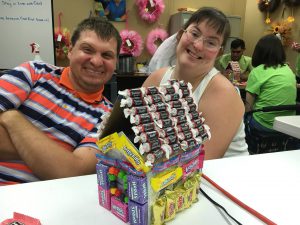
Photo courtesy of Exceptional Entrepreneurs.
By Lilla Ross-
For Exceptional Entrepreneurs, it’s not about the paycheck, but there’s a definite pay off. Three days a week 17 adults with developmental disabilities, ranging in age from 18 to 76, gather at Grace Community Center to perform simple jobs with the assistance of a dozen regular volunteers, said Executive Director Margaret Wear.
They provide services like shredding, collating and basic computer repair and maintenance. And, they make things like yard art from vinyl records, wreaths and fire logs made from shredded paper.
The products are sold at Franklin Shops in downtown Fort Myers, Florida, and on Facebook. The proceeds help support the program, making up about a third of the budget.
Exceptional Entrepreneurs is a ministry of Grace Church, a multisite United Methodist church with campuses in Cape Coral, Fort Myers and Sarasota. The ministry to the disabled and their families works on the premise that the disabled are capable of knowing Jesus as their “Forever Friend” and sharing His unconditional love with others.
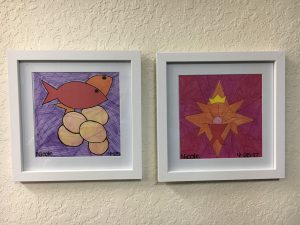
Photo courtesy of Exceptional Entrepreneurs.
Included are a weekly Through the Roof buddy ministry, pairing a special needs child with an adult buddy in the children’s ministry as parents attend worship, and a monthly Respite Night for families in which child and siblings are cared for, giving their daily caregivers a night out.
The program was started in the fall of 2012 by Betty Henderson, a former special education teacher and avid gardener. In the beginning, six special education students from Lee County public schools, accompanied by two volunteers, came once a day to work on a worm farm, which produced garden compost and fishing bait.
As the program expanded, the students began making yard art using melted vinyl records that were shaped into flowers and painted.
In October 2013, the program expanded with the help of a $30,000 grant from the Southwest Florida Community Foundation that enabled the program to hire two disabled adults for nine hours a week. By February 2015, 13 people were employed and 20 students from four high schools came regularly to learn job skills.
But the school-focused program had become unwieldy, with students from different schools arriving at different times, Wear said. It was decided to repurpose the program to focus on helping disabled adults. That is when Wear came on board as executive director. She had worked with moderately disabled students as an employment specialist with the Lee County school system.
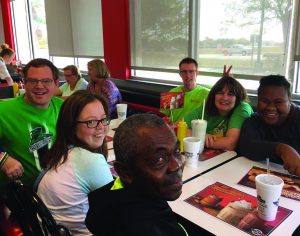
Photo courtesy of Exceptional Entrepreneurs
With a new focus, the program expanded its array of items made by the participants to sell, increased training and improved the quality of the materials used.
“Nobody just sits,” Wear said. “Everyone needs to be engaged in meaningful activities. We give them the opportunity to experience different jobs and tasks. You can get an idea if it’s something they like to do. Once you find their interests, you try to stretch their interests, and you see some amazing progress.”
One young man, Josh, who has autism, was nonverbal when he started with the program, but now he can speak complete sentences and sometimes leads the prayer at the morning devotional, Wear said.
Another woman, Nicole, was so frightened at first that she cried and cried and wrapped herself in an orange blanket, Wear said. Though she is still reluctant to interact directly with people many days, she watches everything in a mirror over her workstation. She has blossomed into a promising artist, and her work is being marketed.
At 76, Walter is the oldest entrepreneur. He rides his bike to a store where he sells honey sticks, five to a package.
Each workday begins at 9 a.m. with a devotional. After lunch, the focus shifts from working to learning life skills and socializing. Friday is movie day when this unique working family meets somewhere for lunch and goes to a movie.
Last summer the participants went through a 14-week culinary arts program. A financial planning class was offered to families. In December, participants had the chance – some for the first time – to dress up and be escorted down a red carpet to a Christmas party.
Exceptional Entrepreneurs is a ministry that lets disabled adults – who are often ostracized – work, learn and play.
Lilla Ross is a freelance writer based in Jacksonville, Florida. Reprinted by permission of the Florida Annual Conference.

by Steve | Jul 10, 2017 | July-August 2017, Magazine, Magazine Articles
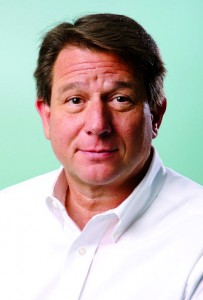 By Frank Decker-
By Frank Decker-
Before I became a missionary, I served a small United Methodist church in Virginia while in my 20s. There was a family in the neighborhood to whom we provided assistance from time to time. One day their grade school-aged daughter was playing with some friends at the church, and she wandered into the kitchen where I was loading a bag of groceries. “Are you going to take that food to a poor family?” she asked me. I responded, “No, sweetie. I’m taking this to your family.” Her eyes lit up and she happily went back to join her friends down the hall.
While I may have stumbled into a quick-thinking response to that situation, I have increasingly become aware of the need to pay attention to the way that those to whom we seek to minister view us – and, how they think we view them. For example, it has always puzzled me why, in mission and evangelism circles, we have referred to those whom we are seeking to reach as “target” people groups. After all, what is the most common use of a target? Doesn’t it usually involve some sort of weapon? In the book Leadership and Self-Deception, The Arbinger Institute points out: “No matter what we’re doing on the outside, people respond primarily to how we’re feeling about them on the inside.”
I am suggesting that whether we are aware of it or not, we are likely to view those outside of our religious fold in one of two general categories: people who should be won, or people who should be served. Correspondingly, they will perceive our intentions, in broad strokes, as the intentions of a “crusader” or the intentions of a “servant.” I realize the potential pitfalls of taking this simple thought too far. Still, I submit that a servant is one who is seen by outsiders as motivated to serve others by meeting their needs, while a crusader is one who is motivated to enlist others and bring them into the fold (even though acts of service are often employed by crusaders to accomplish this).
A missionary who served in the Middle East for more than a decade tells the story of being invited to a mosque by an Imam to speak to his congregation. Before the missionary preached, the Imam said to him, “You can share about Jesus, but not about Christianity.” The missionary said he was initially taken aback by the Imam’s request. Then he remembers thinking to himself, Well, I think that’s okay. That turned out to be a watershed moment in the missionary’s journey. He more fully realized the distinction between helping people to see Jesus versus simply getting them to join the team.
The Apostle Paul said, “Let a man consider us as servants of Christ and stewards of the mysteries of God” (1 Corinthians 4:1). When we are perceived as those whose desire is to serve, defenses against spiritual conversations that otherwise may arise are likely to be relaxed. And the more we behave – and are perceived as – servants, the more receptive people will be to the One who “came to serve and give his life as a ransom for all.”
The way that people outside of the faith perceive our mission efforts is important. If Jesus were merely the founder of one of the world’s religions in competition with other religions, then a crusader mentality might make sense. But if he is the Messiah whose Kingdom can pervade any religious context, then his message must be understood on a level deeper than “our religion versus yours.” Nonetheless, I believe that millions outside of Christianity view us as crusaders instead of servants, with the accompanying conclusion that Jesus is irrelevant to them.
“The vision is Jesus. Not Christianity. Not prayer, mission, and justice,” writes Pete Greig in Dirty Glory. “Not worship-leading or church-planting or evangelism. If you love Jesus, you’ll do that stuff: You’ll pray and worship and go to church and preach the gospel. But in doing all those things, don’t lose the way, don’t get lost in the crowd. It might be healthier if we all just stopped being Christians for a bit – a week, a month, or even a year. We’re just too good at it. It has become habitual. We’ve been operating out of religious muscle memory…. Urgent voices are calling us to abandon the familiar comforts of Christendom, to strike out into the unknown and rediscover the Nazarene.”
It is no surprise that we have this challenge, this tension between servant and crusader. But that is all the more reason why we must ardently pursue his example of a servant.
Frank Decker is the Vice President for Training and Formation at TMS Global – www.TMS-Global.org.

by Steve | Jul 10, 2017 | July-August 2017, Magazine, Magazine Articles
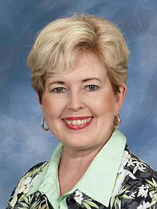
B.J. Funk
By B.J. Funk-
Motel Six television commercials are known for their “We keep the light on” advertisements. These words might not mean much to some, but they send a comforting beacon to many for whom the light has been turned off. Weary travelers find hope when they reach a place of safety and rest.
The same is true for heartbroken or rejected people. For those who have ever had a door slammed in their faces, or a rejection that feels like hard fists in the stomach, the encouragement of finding a place that actually keeps the light on is an oasis of hope, a contrast to their desert of darkness. Just as Motel Six reaches out for weary travelers, weary lives find hope when they reach a place of safety and rest.
Already today, you have probably passed by someone in the grocery store or at work who longs for a light to be left on for them. You likely did not notice, for many searchers of light are masters at covering up their need. They mix their hurts with an addiction to numb the pain, taking on excessive swallows of poison as they grow deeper into their belief that they don’t really matter to anyone else. Why, then, should they matter to you?
Or, perhaps it is the opposite. They laugh a little too loudly, tell a few more jokes than anyone else, and maybe, if you look deeply enough, they never allow you to really get into their lives. We only see portions of them, the sunny side of them, the “I’ve got life, and I’m great” side of them. One gets the feeling that honesty has never rested its head on their heart, as they cake on layer after layer of “Everything is okay! Really, it is.”
Then, on a night when no one expects, a crash comes through their cover-up plans, and a raw pain that hurts deeper than they ever imagined comes forth. Pretense falls, and truth walks in. It is not fun. It’s not fun to realize that all your hidden secrets are hidden no more, that now your family and friends will see the dark side of you. It is more than you can bear. You want to climb in a closet, and shut out the world.
Except for one giant, marvelous word, you might. One word that dares to break the closet door open and pull you out. A soothing, yet forceful word that is claimed by the one who made it, the one who is the very same, the one who is over and above all others. God is that one, and the healing word is Mercy.
Mercy takes the same hammer that nailed Jesus to the cross and yanks out the nails that hold you captive inside the closet. God paid too much for you to live in an embryonic state of mind inside of mold, dark, and nothingness. Mercy claims you, holds you, enfolds you, and calls you His own.
Come out from hiding. Your life is not over yet. Mercy will always keep the light on for you. Mercy kept the light on for one of our heroes in the Bible. King David was at one time surrounded by as many as ten thousand enemy soldiers. He was running for his life from his rebellious son, Absalom, and a host of traitors. David could have trusted his army to defeat his enemies, but instead he trusted in the mercy of God. He wrote in Psalm 3: “But you are a shield around me, O Lord; you bestow glory on me and lift up my head. To the Lord I cry aloud, and He answers me from his holy hill. I lie down and sleep. I wake again, because the Lord sustains me.”
Mercy kept the light on for David. Even when his enemies sat in the dark shadows of evil plots against him, David trusted God for mercy.
Whatever you are facing today, wherever you went wrong yesterday, however your fear blocks tomorrow, look for the sign that assures you that mercy blinks a welcome light for you. Then, settle peacefully into this moment, and allow the Light of Jesus to do what it always does. Receive peace as you rest in this place of safety and hope.
Discouraged? Hopeless? Mercy will always keep the light on for you.

 By Steve Beard-
By Steve Beard-





 By Frank Decker-
By Frank Decker-